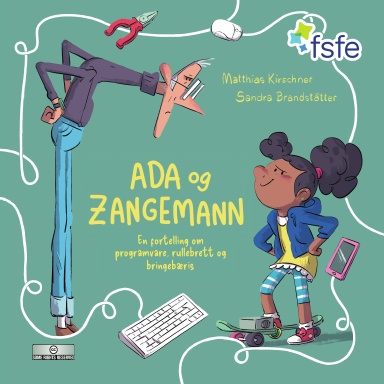
Tilbake i november 2023 oppdaget jeg boken Ada & Zangemann, skrevet av Matthias Kirschner og illustrert av Sandra Brandstätter, og fikk med en gang lyst til å sikre at den også var tilgjengelig for et norsk publikum.
Barne- og ungdomsboken Ada & Zangemann forsøker å inspirere til digital selvråderett, kontroll over egne dingser og demonstrere hvor viktig det er å ha rett til å reparere og forbedre eget utstyr. Den forteller historien om hvordan Ada og vennene hennes protesterer på at kun en enkelt person skal kunne bestemme hvordan datamaskiner og dingser brukes.
Jeg tok med en gang kontakt med forfatteren og sjekket ut git-depotet med manuskriptet for å se hva som skulle til for å lage bokmålsutgave. Før jeg ville gå igang med å oversette boken så ønsket jeg å endre byggeprosessen for HTML- og PDF-utgavene, for å forenkle oversetterprosessen og gjøre det mulig å holde rede på hvordan oversettelsen stemte med originalen og andre språk. Jeg sendte inn et endringsforslag som tok i bruk gettext PO-filer til å vedlikeholde oversettelser, opprette PO-filer for eksisterende oversettelser som ble godt mottatt. Sammen med Nico Rikken fra Nederland har vi skrevet om hele bokbyggeprosessen som nå bruker Docbook XML som automatisk omformes til Scribus XML og direkte til HTML for typesetting og nettsidepublisering. Dette gjøres enten direkte eller kombinert med oversettelser i PO-format til oversatt utgave.
Med dette på plass kunne så oversetterarbeidet endelig gå i gang på oversetternettstedet Weblate.
Til selve oversetterarbeidet fikk jeg god hjelp av et par andre dugnadsarbeidere, Hagen Echzell og Henrik G. Sundt, som både har hjulpet til med å oversette fra den engelske oversettelsen og samkjørt den norske oversettelsen med den tyske originalen. Uten hjelp fra disse hadde boken ennå ikke vært ferdig.
Oversettelsen og boken var egentlig ferdig i desember, men takket være noen påkrevde tekniske endringer i siste liten for å sikre at manuskriptet var i tråd med kravene fra Lulu for bokhandeldistribusjon er det først nå på nyåret at den er tilgjengelig for et videre publikum. Resultatet er at jeg i dag er veldig glad for å kunne annonsere at bokmålsoversettelsen er klar og tilgjengelig for bestilling på papir via lulu.com. Den kringkastede bokinformasjonen ser slik ut:
Oppfinneren Zangemann er verdenskjent og uhorvelig rik. Både voksne og barn elsker hans fantastiske tekniske oppfinnelser. Men en dag er det et problem: barnas elektroniske rullebrett virker ikke lenger som de skal. Hva er det som skjer? Den nysgjerrige jenta Ada innser hva som foregår. Sammen med sine venner eksperimenterer hun med maskin- og programvare, og barna lager en plan: Zangemann kan ikke lenger være den eneste som kontrollerer dingsene!
En bok som vekker interessen for fikling og oppmuntrer til å forme teknologien.
En ide fra forfatteren, som han forklarte hadde vært brukt med hell i andre land, var å oppfordre folk til å kjøpe et eksemplar og donere til sitt lokale bibliotek. Det høres ut som en god ide, og jeg vil herved oppfordre alle som synes boken er flott og fortjener et større publikum til å bestille et eksemplar ekstra og donere det til et bibliotek som mangler boken i samlingen sin. Hvis du bestemmer deg for å gjøre dette, send meg gjerne en epost (pere-adazangemann (at) hungry.com) om dette med informasjon om hvilket bibliotek du har tenkt å gi boken til, så skal jeg vedlikeholde en liste over biblioteker som har fått boken til sin samling og slik gjøre det enklere å se om ditt bibliotek trenger en bok.
Bokens bruksvilkår er
Creative
Commons Attribution-ShareAlike 4.0 International, som lar alle
dele og endre på både råfiler og det ferdige resultatet, så lenge alle
som mottar innholdet kan gjøre det samme. Overskuddet fra salg av
boken går til
Vi håper å å lansere boken med et sosialt arrangement, for eksempel en høytlesning eller lignende, og å se om vi kan få forfatteren til Norge for å fortelle mer om boken. Foreningen NUUGs leder Thomas Hansen ser på hva som er mulig å få til der. Ta gjerne kontakt på epost hvis du for eksempel er en bokhandler, lærer eller bibliotekar og er interessert i et slikt arrangement for å spre ordet om boken.
Neste steg for min del er å se om vi kan få på plass flere språkutgaver av boken, i første omgang en nynorsk utgave. Første utkastet for nynorsk oversettelse er klar, men det trengs (antagelig en god del) korrekturlesing før den er klar til utgivelse. Jeg har også en kamerat som er interessert i å bidra til en arabisk utgave. Der også gjenstår det mest korrekturlesing, men også endel teknisk arbeide med typesettingsverktøyet Scribus for å håndtere tekst som flyter fra høyre mot venstre. Hvis du er interessert i å bidra til flere språkutgaver, ta en titt på Weblate-prosjektet og ta kontakt på epost. Det er også en animasjonsfilm med norsk tale på trappene, som vi håper lansere i løpet av våren.
Som vanlig, hvis du bruker Bitcoin og ønsker å vise din støtte til det jeg driver med, setter jeg pris på om du sender Bitcoin-donasjoner til min adresse 15oWEoG9dUPovwmUL9KWAnYRtNJEkP1u1b. Merk, betaling med bitcoin er ikke anonymt. :)